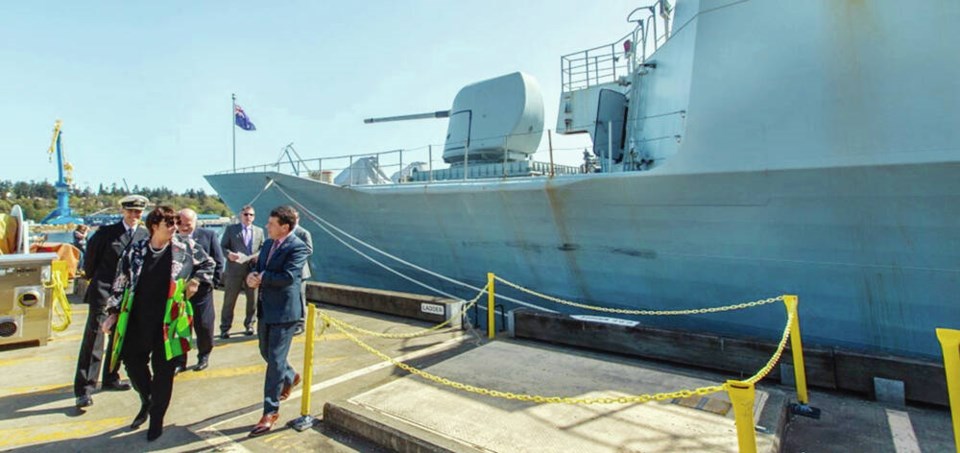A temporary stay of proceedings has been granted in a court case involving work on two New Zealand navy warships, to allow federal officials to vet 200,000 pages of sensitive documents.
In 2014, New Zealand hired Lockheed Martin Canada Ltd., the defendant, to modernize weapons, communications and other combat systems on its two navy warships.
Plaintiff Victoria Shipyards was sub-contracted to carry out a portion of the work in 2018 on the Te Kaha and the Te Mana frigates.
The Te Kaha was handed over to Victoria Shipyards during a ceremony in 2018. Lockheed Martin said at the time that it was the first time since the Second World War that a foreign warship was being modernized in Canada.
Work continues to be carried out at the federally owned Esquimalt Graving dock, court was told.
The hope in 2018 was that the contract would put Canada on the map internationally and attract customers for additional high-tech ship systems contracts. But Lockheed Martin and Victoria Shipyards ended up in court, each claiming breach of contract and negligence and denying the other’s claims.
In a decision posted May 12 on the B.C. Supreme Court website, Justice Sandra Wilkinson said the main issues in the action centre on the design, construction and installation of the combat system for the frigates, including allegations of negligent ship design and negligent management of the design and construction process.
Documents created and exchanged as the modernization proceeded are sensitive, and may contain information that involves Canada’s national security, national defence and international relations, Wilkinson said.
The Attorney General of Canada argued information related to the capacity and capability of the frigates is of concern to Canada as “potentially injurious information,” under section 38 of the Canada Evidence Act.
That section sets out a review process to deal with the use and protection of information that, if disclosed, “could injure Canada’s international relations, national defence, or national security.”
Government legislation requires parties — such as the two companies — to notify the Attorney General of any potential disclosure of this kind of information.
In 2021, Lockheed Martin notified the attorney general about sensitive documents.
The Attorney Genera has confirmed that some of the documents hold injurious information, Wilkinson said.
The federal review has already delayed the dispute, which was scheduled to go to trial on July 11.
Wilkinson decided to grant the temporary stay to allow the review to be carried out.
The Attorney General has said it is unable to provide an accurate estimate of when the review might be concluded — Wilkinson said the process often takes a number of years.
The pandemic has made examination of the documents difficult, since they can’t be transmitted electronically and the review must happen in person, she said. Each of the 200,000 pages may take one hour to review, according to the Attorney General.
Ultimately, the Attorney General and the Federal Court may have a “serious issue to consider in determining whether such information may be disclosed and what safeguards may be required to allow that to happen,” Wilkinson said.
The judge said the Attorney General has authorized the two parties to jointly communicate with that office regarding the review. She said she is hopeful the review can be completed within a reasonable time, and that the parties will be able to settle their dispute without needing to go to trial.
cjwilson@timescolonist.com



